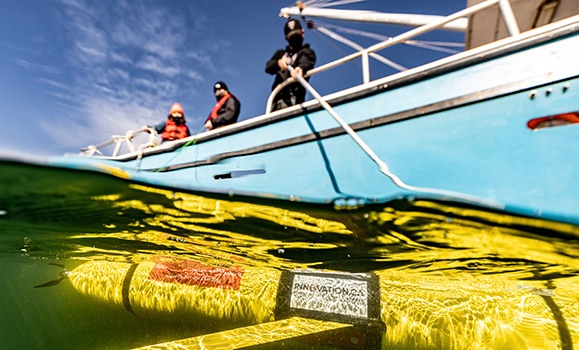The Ocean Tracking Network, headquartered at Dalhousie University, has been awarded a grant of $38.5 million from the Canada Foundation for Innovation’s (CFI) Major Science Initiatives Fund.
The grant brings the total amount awarded to the Ocean Tracking Network (OTN) for its 2017-2029 funding cycle to $65.6M — resources that will help sustain and grow the renowned global aquatic research, data management and partnership platform.
Collaborators around the world are using OTN’s global infrastructure and analytical tools to document the movements of more than 300 keystone and commercially and culturally valuable aquatic species in the context of changing ocean and freshwater environments. Since 2008, OTN has been deploying innovative ocean monitoring equipment and marine autonomous vehicles (gliders) in key aquatic locations around the globe and has since expanded to include remotely operated vehicles and side scan sonar technology.
OTN is the only Major Science Initiatives (MSI) in Atlantic Canada. The MSI Fund supports the unique operating and maintenance needs of some of Canada’s leading research facilities — both physical spaces and virtual networks — to serve researchers as they continue driving science and innovation and developing solutions for some of today’s most complex and important societal issues. The funding announced today includes an investment of more than $628 million to support 19 national research facilities at 14 institutions across the country.

Sara Iverson (left), OTN scientific director, with Fred Whoriskey, OTN executive director.
“This significant investment from CFI will allow OTN to maintain and advance its headquarters operations and activities, while remaining agile and adaptable to emerging science priorities in Canada and internationally,” says Sara Iverson, OTN’s scientific director.
Global collaboration
OTN is fostering collaboration at a global scale and transforming aquatic species research into knowledge that benefits both Canada and the world. This includes monitoring the global movements and behaviour of sharks to better inform and protect beachgoers, supporting community-driven efforts to track and sustain commercial species, and assisting in the design of marine protected areas (MPAs) and transboundary fisheries management practices as well as many other projects on highly valued aquatic species.
Since 2017, the reach and impact of OTN has grown exponentially. The network has more than doubled in its registered users and networked investigators. Detection data from network collaborators has increased four-fold, from 250 million to over 1 billion records, while marine gliders have travelled over 138,936 kilometers–over three times the earth’s circumference.
“Over the next six years, the funding will allow OTN to expand the core operations and activities that underpin the network’s mandate, including continuing to deliver on our world-class marine glider program, expanding subsea robotics activities, and supporting the integration of satellite-derived animal movements data into the OTN Data Centre,” says Dr. Iverson. “OTN will also continue to help Canada meet its commitments to the United Nations (UN) Decade of Ocean Science for Sustainable Development (2021-2030).”
Protecting marine species around the world and here at home
OTN also plans to build further technical support and capacity for its marine glider program — the first and most expansive of its kind. Along with conducting general ocean monitoring and servicing equipment at sea, the program uses hydrophone-equipped gliders to detect the calls of critically endangered North Atlantic right (and other) whales and transmit the animals’ locations in near real-time to regulatory bodies and vessels in the region. This work is helping to greatly reduce the risk of right whale ship collisions and is supporting the protection of critical habitats, such as the Roseway Basin off southeastern Nova Scotia.
“The amount that remains undiscovered about the ocean and the species that call it home is vast,” says Alice Aiken, Dalhousie’s vice-president research and innovation. “As the impacts of climate change ripple through the waters that surround us, it is becoming increasingly urgent to address this knowledge gap. With support from CFI, OTN’s cutting-edge research, technological innovation and global partnerships are helping to build the knowledge we need to revolutionize our understanding and stewardship of aquatic species around the world.”
With the funding awarded, OTN will be able to:
- Grow and maintain OTN’s headquarters, infrastructure and operations
- Continue to meet the growing demands of its Canadian and international user communities
- Bolster communication of data and outcomes in support of Canadian and international science and sustainable management of shared aquatic resources
- Facilitate leading-edge research with Canadian-made technologies
- Support the UN Sustainable Development Goals
A full list of the newly funded projects is available at the Canada Foundation for Innovation website.
Comments
comments powered by Disqus

